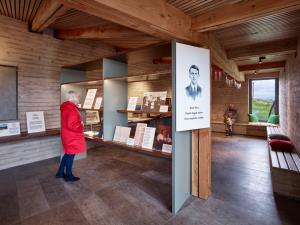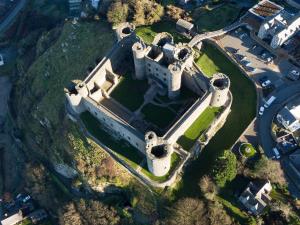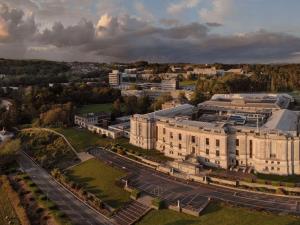The greatest honour for any Welsh poet is to win the chair at the National Eisteddfod. It’s still the centrepiece of the festival today: the poet’s name is announced, and the winning bard processes through the crowd, amid great fanfares, to take their seat on the bardic chair.
At the 1917 National Eisteddfod the Archdruid called out the nom-de-plume of the winning bard three times, but nobody stepped forward. Then he solemnly announced that the poet had been killed in battle six weeks earlier.
The chair was draped in a black shroud, and the Archdruid spoke of ‘the festival in tears and the poet in his grave’. Today, the 1917 festival is known as ‘Eisteddfod y Gadair Ddu’ – the Eisteddfod of the Black Chair. The poet was Ellis Humphrey Evans – better known by his bardic name, Hedd Wyn (blessed peace).

Hedd Wyn was born on 13 January 1887, in Trawsfynydd, the first of 14 children. He began writing poems aged just 11, mastered the hardest form of Welsh poetry (the cynghanedd) at 12, and continued to write after leaving school to work on the farm when he was 14. By 19 he was a regular competitor in eisteddfodau and won the first of his six chairs at Bala Eisteddfod in 1907. In 1910, he took the bardic name Hedd Wyn.


The carnage of the First World War had a profound effect on both his poetry and his life. A Christian pacifist, Hedd Wyn hadn’t enlisted, but when conscription began in 1916, the Evans family were required to send one of their sons to war. To spare his younger brother, Robert, Ellis volunteered.
In March 1917, he was allowed to return briefly to Trawsfynydd to help with the ploughing and planting at the family farm, Yr Ysgwrn. While he was at home, he began work on a new poem, Yr Arwr (The Hero) which was to be his submission for the forthcoming eisteddfod. The work on the farm took longer than expected and Ellis overstayed his leave of absence, leading to an abrupt departure as the military police arrived to return him to his post. In the confusion, the uncompleted poem was left behind. Hedd Wyn wrote it again as he travelled to join up with the 15th Battalion Royal Welsh Fusiliers at Fléchin in France, from where he posted his poem.
On 31 July 1917, Ellis Evans was killed at Pilckem Ridge near Ypres. He was one of 9,300 British troops who died in the first three days of the Battle of Passchendaele. At home in Trawsfynydd, the whole village turned out in mourning as the black chair was delivered to the family farm.
Hedd Wyn’s nephew, Gerald Williams, continued to farm Yr Ysgwrn, always keeping the door open to a steady stream of visitors who made the pilgrimage to the poet’s home. As he reached his mid-80s, Gerald began to think about the farm’s legacy. In 2012 he sold it to Eryri (Snowdonia) National Park, with conditions attached: it should remain open to visitors, and it should feel like a home, and not a museum.
After careful restoration, Yr Ysgwrn re-opened as a visitor centre. The Black Chair remains there as a powerful symbol of the generation of young men who fought and died in the First World War, and the Grade II* listed farmhouse and nearby cowsheds have now been repaired into cosy spaces to welcome visitors.


The cultural centre is accessible, including the historic buildings, farmhouse tours, farm trails, exhibitions, café and shop. Locally roasted coffee, baked goods and savoury treats from local producers are served, all available to enjoy while looking at spectacular views of the peaks of Eryri and the hills of Cwm Prysor.
A range of artwork and interpretation installations inspired by the story and surroundings of Yr Ysgwrn are on display as well as a full programme of activities and events. There are walks, musical evenings, exhibitions, talks, a forest school, a gardening club and all kinds of other opportunities available.


Visiting Yr Ysgwrn
Yr Ysgwrn is open to the public from Easter until the end of the autumn half term. Groups can visit in the winter by prior arrangement. There are special offers for group visits. Visit Yr Ysgwrn's website for opening hours.
Follow Yr Ysgwrn on social media:

And while you’re in the area…
Trawsfynydd lies pretty much at the centre of the Eryri (Snowdonia) National Park, with fabulous attractions within a 30-minute drive in all directions. Head north, and you’ll be in Blaenau Ffestiniog’s slate-mining, mountain-biking, zip-wiring hotspot. To the south is Coed y Brenin, the UK’s first mountain-biking centre.
A short drive west and you’re in the Italianate fantasy village of Portmeirion, with Castell Harlech just down the coast. To the east, the River Tryweryn provides all the necessaries for the National White Water Centre. And in every direction, stunning mountain views come as standard.
Search for accommodation near Trawsfynydd.
Search for attractions and activities in Eryri (Snowdonia).

The National Library of Wales, Aberystwyth
Aberystwyth’s National Library of Wales hosts the original manuscript of the ode ‘Yr Arwr’ – Hedd Wyn’s final draft of the poem which won him the chair at the 1917 Birkenhead Eisteddfod. The collection also includes a number of personal notes and items and notes of the bard.













